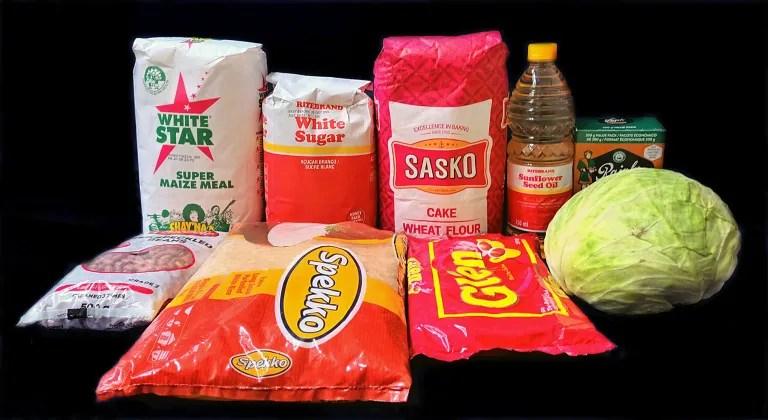Daily Maverick has been tracking the prices of 14 food items since 2022 in a simulation of what a person who receives only the Social Relief of Distress (SRD) grant as an income can purchase.
 Curry powder and salt prices saw big decreases while there has been an increase in sugar, cooking oil and tea. The rest of the basket remained the same. The basket remains unaffordable for social relief of distress grant beneficiaries at well over R400
Curry powder and salt prices saw big decreases while there has been an increase in sugar, cooking oil and tea. The rest of the basket remained the same. The basket remains unaffordable for social relief of distress grant beneficiaries at well over R400
Annual consumer price inflation was 5.1% in June 2024, down from 5.2% in May 2024, according to the latest Stats SA Price Index released on Wednesday morning. This is the lowest since early 2020 when it was at 3.8%. At its height, food inflation soared to 14%.
The Consumer Price Index increased by 0.1% month on month in June 2024. The index shows that there has been a marginal increase in food and non-alcoholic beverages (up by 4.6% from this time last year – transport increased by 5.5%).
In June 2024, the annual inflation rate of goods was 5.5%, down from 5.7% in May 2024.
Read in Daily Maverick: SRD grant recipients are losing the battle to afford basic foods, let alone nutritious food
The lowered inflation was reflected in the Household Affordability Index, where the food basket of 44 core goods decreased by R77.53 (-1.5%) from R5,330.30 in May 2024 to R5,252.77 in June 2024.
But people are still paying more this year for the food basket than they did this time last year. Year on year, the cost of the average household food basket increased by R196.32 (3.9%) from R5,056.45 in June 2023 to R5,252.77 in June 2024.
The Food Inflation Brief released at the end of June explained that expectations for food inflation were driven by multiple factors, including agricultural commodity prices and costs in the supply chain.
“While the weaker domestic summer crop will likely see inflation on maize meal rise in the coming months, a critical factor that influences both the cost of primary agricultural commodities and several costs in the value chain is the exchange rate. Exchange rate depreciation for much of 2023 was a critical contributor to sustained high food inflation, but the value of the rand strengthened substantially in June this year,” the brief said.
“This follows improved sentiments following the election result, which ushered in the first coalition government in South Africa since the dawn of democracy. Markets responded positively to the formation of the Government of National Unity and while key factors such as Cabinet positions are yet to be finalised, a stable partnership in this regard could result in further exchange rate appreciation, which would in turn reduce inflation further,” the brief said.
The Healthy Living Alliance is calling for the Health Promotion Levy to be increased to 20% to enable an increase of the child grant to R760. The alliance launched a petition on Amandla.mobi which now has more than 1,100 signatures.
Alliance communications manager Zukiswa Zimela said this was important because the Child Support Grant had not kept up with rising food prices, and so many children and families went hungry. “The reality is Heala implored the minister of finance to “take responsibility to raise enough funds to increase the Child Support Grant to at least the Food Poverty Line, which is currently R760 per person per month”.
“The reality in South Africa [is that] eight million children go hungry every day and we also see that one in eight children are overweight, so the issue of food and ensuring that kids are nourished needs to be addressed with some urgency because these children grow up to be adults where one in two are obese. Being obese can lead to non-communicable diseases such as diabetes,” Zimela said.
The petition pointed a finger at the National Treasury for its years of failure to increase the Health Promotion Levy (HPL). The levy not only contributed to the fiscus, but also reduced the consumption of sugary drinks, which in turn reduced the risk of life-threatening non-communicable ailments such as diabetes and heart disease.
“That is why we are calling on the Treasury to increase the HPL to the World Health Organization’s (WHO) recommended 20% rate with annual inflation-related increases thereafter and immediately begin the public consultation process of expansion to fruit juices,” the petition says.
The department is yet to respond to the petition, but Zimela explained that the department had previously said it did not ring fence money, but allocated it as and when needed after all necessary steps had been taken.
Zimela said they hoped the government would implement the increase so the sugar tax had an impact and “doesn’t lose its efficacy”.
“We have the power to protect children from hunger if we come together and demand the minister of finance to take action. Not only would increasing the Health Promotion Levy raise funds that could help fight child hunger, but it would also help reduce the consumption of sugary drinks, which contribute to non-communicable diseases, which are a major health crisis,” the Healthy Living Alliance petition says. DM




 (Graphic: Rudi Louw)
(Graphic: Rudi Louw) 